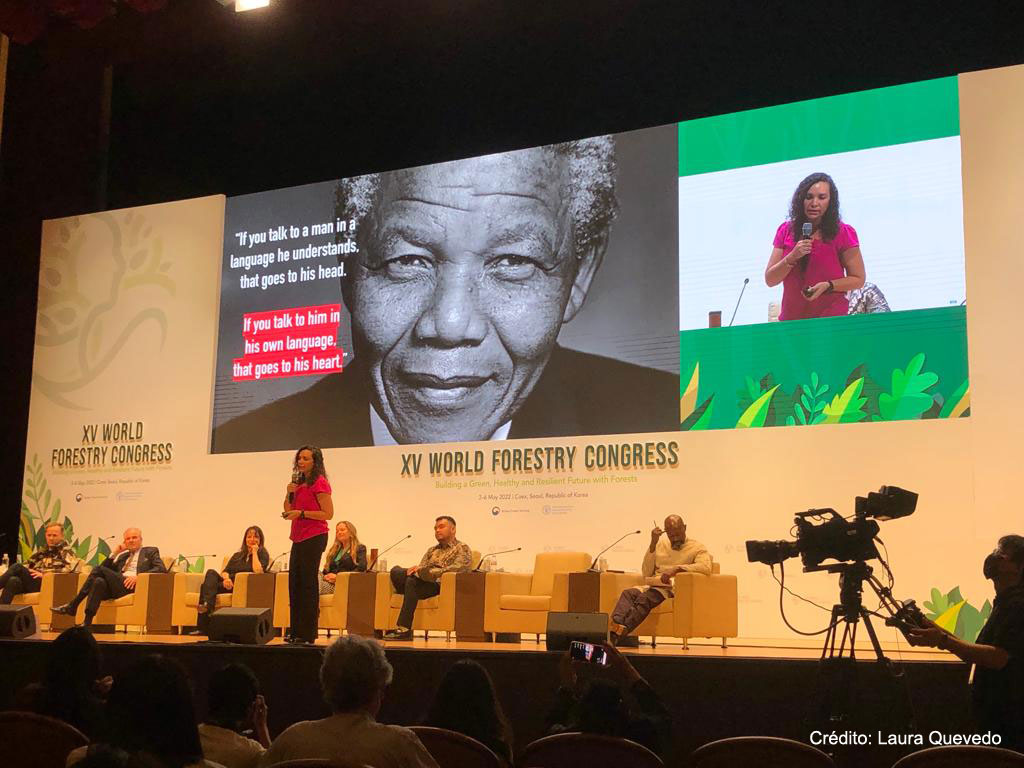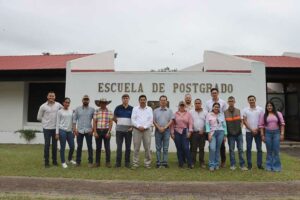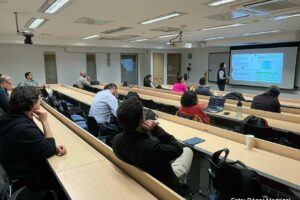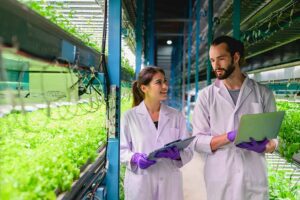Communication on forests made room at the XV World Forestry Congress.

- The session Harnessing the Communication Effect addressed how to communicate to generate a greater impact, with the participation of Marianela Argüello L., from CATIE's Environmental Economics and Sustainable Agribusiness Unit.
May 13, 2022. Finding the best way to optimize science-policy collaboration and improve communication aubot forestry issues to a wider audience was one of the issues discussed under Sub-theme 5: Managing the communication of forestry information and knowledge at the 15th World Forestry Congress (WFC) of the Food and Agriculture Organization of the United Nations (FAO), held May 2-6 in Seoul, Republic of Korea.
In this context, Marianela Argüello L., communication and knowledge management officer of the Environmental Economics and Sustainable Agribusiness Unit (UEASS/EfD) of CATIE (Tropical Agricultural Research and Higher Education Center) and coordinator of the Network of Forestry and Environmental Communicators for Latin America and the Caribbean (Recofalc), was one of the speakers at the May 5 session entitled Harnessing the Communication Effect.
During her participation, Argüello addressed six key communication points to achieve relevance at the local level, highlighting the importance of knowing how to listen, knowing the audiences we are addressing, as well as identifying windows of opportunity to position key forestry or environmental issues or messages among the population. She also discussed the use of information and communication technologies that adjust to local preferences and the importance of forming coalitions, such as the networks of forestry communicators that exist in different parts of the world.
It is essential to understand the great importance of communication to successfully achieve goals within forestry or climate projects and actions," said Argüello, who added that, despite this, effective communication is not always achieved.
Many details are omitted, for example, complex and technical language is used and ideas are not presented in a simple way, which sometimes happens when it comes to sharing scientific research results to a non-scientific audience," She explained.
Maria de Cristofaro, outreach and capacity building officer of FAO's Forestry Division, said that the forestry sector needs to strengthen communication with the general public to position forests as a solution to global challenges.
A dynamic session
The sub-theme 5 session answered the question, how can we be bold in our communication about forests to create greater impact and reach wider audiences? which was answered by communication experts from South Africa, the Philippines, Italy, the United States, Austria and Costa Rica.
In addition, the session combined the use of eye-catching videos to complement the ideas shared, as well as an introductory video that included the opinions of people mentioning what they understood by sustainable forest, collected in different countries, thanks to the support provided by the members of the networks of forest communicators. The video included opinions from the Dominican Republic, El Salvador, Brazil and Ecuador, corresponding to our Latin American region.
"The session was dynamic, with clear and direct messages, visually appealing and the viewers felt as if they were having a conversation with us," mentioned Max Yamauchi, a CATIE graduate and collaborator of the Latin American Model Forest Network, based at CATIE.
Yamauchi, who participated in the session, added that apart from techniques, tools and communication strategies, one message was very clear: 'keep it simple'.
Importance of participating in the WFC
"The World Forestry Congress is the most influential conference in forestry, serving as a global platform for members of the international community to meet and produce recommendations and statements on major forest-related issues," said Minister Byeong-Am Choi of the Korean Forest Service, the host institution of the congress, on the official WFC website. For this reason, CATIE's participation in spaces such as this one contributes to its visibility and positioning.
The XV WFC had as its theme "Building a green, healthy and resilient future with forests" and was organized by FAO and the Korea Forest Service of the Republic of Korea, which hosted the Congress on this occasion. It brought together nearly 15,000 participants from more than 140 countries, both face-to-face and online, making it the first bimodal event of its kind since the start of the coronavirus disease pandemic (COVID-19).
The first WFC was held in Rome in 1926 and is held approximately every six years; however, it is since 1954 that coordination with host countries began, as was done in this 2022 with the Republic of Korea.
More information:
Marianela Argüello L.
Communication and Knowledge Management Office
Unit for Environmental Economics and Sustainable Agribusiness (UEAAS/EfD)
CATIE
Written by:
Marianela Argüello L.
Communication and Knowledge Management Office
Unit for Environmental Economics and Sustainable Agribusiness (UEAAS/EfD)
CATIE



